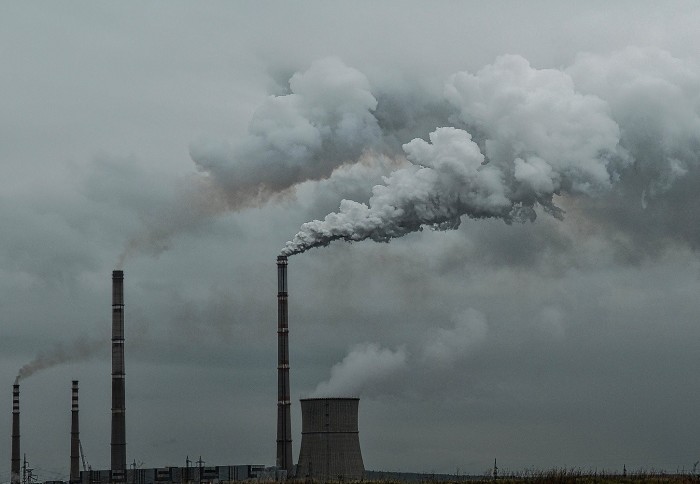Connecting with policymakers to achieve net zero in UK industry

Research Fellow, Dr Gbemi Oluleye, was one of the key speakers at the Achieving Net Zero: Decarbonising Industry roundtable.

In this Q&A Dr Oluleye, from Imperial's Centre for Environmental Policy (CEP), reflects on how the event provided an opportunity to discuss the innovations required to transition to net zero, emphasising the importance of creating spaces where policy makers and other stakeholders can come together to share perspectives and contribute to the conversation.
What did the roundtable aim to achieve?
Roundtable discussions are designed to encourage effective policy making in Westminster. This one was organised by the All-Party Parliamentary Climate Change Group (APPCCG) – a leading forum informing the climate change discussion – and run by Policy Connect, with Imperial’s Grantham Institute as a sponsor.
The event was attended by parliamentarians, business leaders, industry professionals, NGOs and academic experts, and together we aimed to discuss and provide evidence on:
- Costs and benefits of industrial decarbonisation strategies, such as advance material and energy efficiency, switching to alternative fuels, feedstocks, technologies and processes, and Carbon Capture and Storage (CCS)
- How low-carbon processing and industrial systems can be implemented to maintain and strengthen competitiveness of the UK industry
- The role of industrial decarbonisation systems, policy interventions and innovative business models in overcoming barriers to Net Zero Greenhouse Gas (GHG) Industry.
It was a fascinating discussion and a great opportunity to explore innovations required to transition to net zero GHG industry with MP’s, and other stakeholders. It was also an excellent opportunity to showcase the work done by the CEP in this remit.
What is net zero GHG industry?
GHG emissions are carbon dioxide, methane, nitrous oxide, hydrofluorocarbons, perfluorocarbons, and sulphur hexafluoride - carbon dioxide makes up the bulk of these. Net zero GHG industry means that the amount of GHG emissions produced are cancelled out by the amount of greenhouse gases removed. It's all about achieving a balance between the amount of greenhouse gas emissions produced and the amount removed from the atmosphere. There are two different routes to achieving net zero in industry, which can work simultaneously: reducing existing GHG emissions and actively removing GHG.
Tell us more about your research focus
My research expertise lies at the interface of engineering, economics and policy. My background in engineering has provided me with the skills and experience to conduct research to determine the optimum combination of raw materials, fuels, and technologies to achieve industrial decarbonised systems. From here, I integrate economic analysis and policy interventions to show pathways to commercialise these systems – specifically showing how to shorten the time from demonstration to wide spread market adoption. By doing this I aim to address the “valley of death” in energy technology adoption. I also develop decision support frameworks for technology assessment, integration, and energy system design for the process industry. These frameworks have been used to quantify and analyse the impact of existing and new policy instruments and business models.
I am most passionate about maintaining the relevance of the global industrial sector as we pave the way to a zero-carbon economy.
Can you tell us more about the “valley of death” in energy technology adoption – what is this?
In energy technology adoption and commercialisation, the “valley of death” is a metaphor often used to describe the gap between demonstration of new technologies and full commercialisation in the marketplace. The “valley of death” exists between basic research and commercialisation of new technologies.
Policy interventions, and new business models play important roles in advancing clean technologies at all levels of development, from basic research to demonstration, pre-commercial, supported commercial and fully commercial. Shortening the time between demonstration of new technologies and full commercialisation is required to achieve the UK’s ambitious net zero Target by 2050, and by 2040 for an industrial cluster.
Unfortunately, there's a lack of policy interventions (such as market-pull policies) and innovative business models for the industrial sector that directly/indirectly addresses the "valley of death".
The talk you gave at the event was entitled Accelerating the transition to Low-Carbon Industry: Innovations Required – what was it about?
Professor Jon Gluyas (Durham University), Professor Mercedes Maroto-Valer (Heriot-Watt University) and I presented talks. Mine focused on highlighting the three broad categories of innovations required to shorten the time from demonstration to widespread adoption of strategies to achieve low to net zero GHG Industry.
Firstly, I emphasise the need to focus on industrial decarbonisation systems instead of individual strategies or technologies. Integrating several strategies can achieve radical reduction in CO2 emissions at an optimal cost. Therefore, a focus on industrial decarbonisation systems instead of strategies can create a greater demand volume for new and already mature but expensive technologies to accelerate cost reduction.
Secondly, there is a need to focus on the question of how to implement policy interventions. Gaps remain in industrial decarbonisation policy frameworks – specifically there is a lack of market-pull policy interventions to support full-scale commercialisation; a new approach to policy implementation is required to accelerate the transition.
And finally, the focus extends to considering business models. Sometimes policy interventions may not be sufficient, hence business models innovation is required. More ambitious emission reductions are feasible and could enhance industrial competitiveness if innovations in business models occur simultaneously with industrial decarbonisation systems, and policy interventions.
My talk showed that policy interventions for business models would also directly incentivise industrial decarbonisation systems, and this has potential to shorten the time to full commercialisation and market penetration of technologies.
Why was this roundtable such a good opportunity to share perspectives and ideas between, not only different research fields, but also academics and policy makers?
Events like this provide an opportunity for academics to influence policy making by providing evidence and ensuring increased impact as we address global issues like climate change. The event gave me an opportunity to engage directly with policy makers and other stakeholders from the industrial sector.
Where do you go from here?
We'll be publishing a Net Zero Industry Essay, co-authored with Members of Parliament – I’ll keep you posted on this!
Article supporters
Article text (excluding photos or graphics) © Imperial College London.
Photos and graphics subject to third party copyright used with permission or © Imperial College London.
Reporter
Claudia Cannon
The Grantham Institute for Climate Change